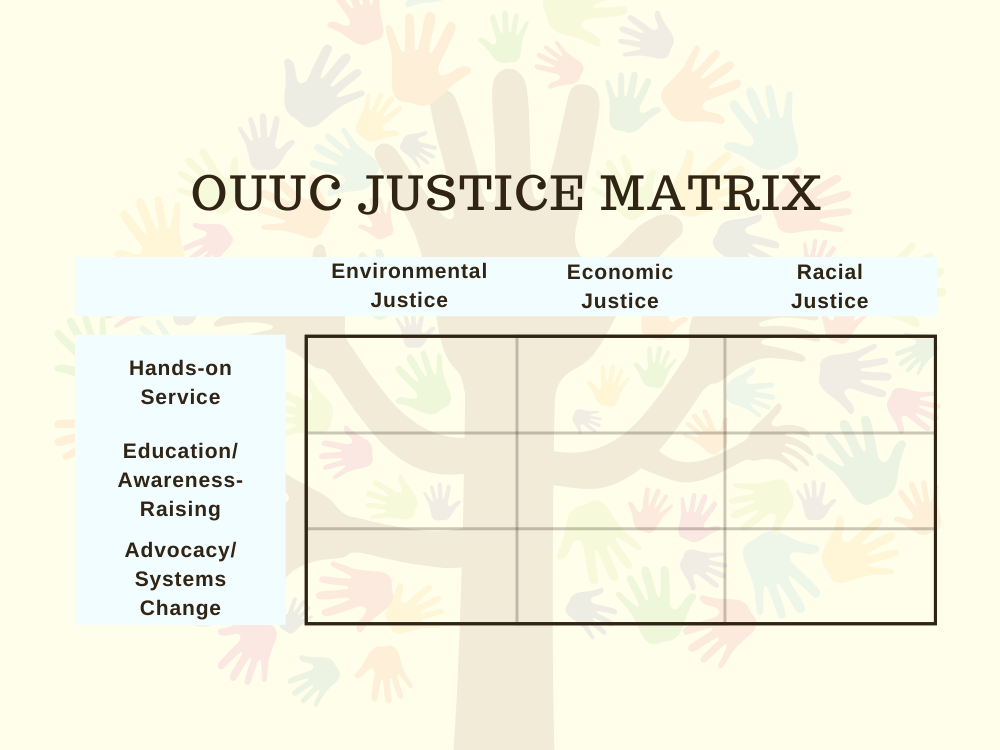Last Fall, those who participated in OUUC‘s Faith in Action Visioning gave input for the FIA Leadership Council to create a matrix to help organize and structure the congregation’s justice efforts. The Council created an OUUC Justice Matrix that looks like this:

The matrix has three areas of focus and three modalities to address the focus areas.
In relation to the modalities, OUUC has a long history of providing direct service to those who are houseless and of education on justice issues. While some of you participate in advocacy efforts, it has not typically been a congregational focus. This Winter I started hosting an Advocacy Reflection Circle for those interested in sharing their advocacy efforts and reflecting together on the experience. The group’s first meeting coincided with the start of this year’s legislative session.
In The Spark back on January 14, I wrote:
“Advocacy is also one of the ways that we put our faith into action. Advocacy is the act of publicly speaking on the behalf of or in support of another person, place, or thing. The legislative session is a great place to practice advocacy. There are many bills up for consideration addressing poverty and food security, policing and criminal justice, housing, environmental justice, human rights, health and mental health. Each of these is an area that UUs are called to advocate for.“
I am so grateful for those who have shown up to the Advocacy Reflection Circle to share their experience and learning. Each gathering has been an intimate and rich sharing as well as a chance to get to know each other better.
When we met this week, one participant asked,” What do you mean by advocacy?” This great question prompted a long and magnificent conversation. I want to thank Emi Allen, Nancy Curtiss, Elizabeth Rodrick, and Jo Ann Young for their reflections and sharing this week.
We reflected that advocacy could mean showing up, speaking up, standing up and offering support. We also said that it requires courage and being uncomfortable at times. We noted that advocacy usually means making efforts toward lager scale systems change.
We talked about how the word “advocacy” has paternalistic roots, as seen in the definition I wrote in January: advocacy has assumed that it is acceptable to speak for someone else. One person mentioned that this word is not used in activist circles, where instead people speak of organizing and allyship. Some shared the experience of helping to create space for others to speak their truth. Perhaps that is advocacy, too.
We shared times when we did speak for others, such as being a legal advocate, and when we spoke for those without a voice, such as the animals and plants and the Earth. We spoke about the importance of relationship building and trust building in advocacy, and how there is an element of consent when we are asked to speak for others. There is responsibility and accountability in advocacy.
Last, we reflected on how this word is like many words and ideas now, it is in transition. Perhaps advocacy can move past its paternalistic heritage and move toward “being with” rather than “speaking for.”
Thank you to these four people and the others who have joined the Advocacy Reflection Circle discussions. The group will meet every other Tuesday at 4 pm through the legislative session and probably monthly after that. You can find the link in the OUUC Weekly Update and on OUUC calendar on the website. We meet again on April 6. Everyone is welcome. Come and share what you think advocacy is and how it might help you put your faith in action.
Blessings on your week.
Rev. Mary
